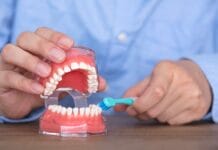Haven’t we all had a patient refuse assessment modalities or treatment? Some patients do not want anything to do with certain procedures, whether that be radiographs, periodontal probing, or non-surgical periodontal therapy. However, these procedures are crucial in providing comprehensive patient care and upholding the standard of care.
I have experienced patients refusing many different types of assessments and treatments. Sometimes, patients may refuse due to financial constraints or not liking the procedure.
Taking radiographs can be slightly uncomfortable sometimes, so patients want to avoid that. There are tricks and ways to improve taking radiographs, such as cushions or distracting the patient by having them raise their foot.
Patients may use the excuse that they do not have enough time to avoid assessments. When this situation occurs, I explain that it only takes a few minutes and state how long the appointment is scheduled. However, most of the time, the patient knows how long the appointment is scheduled.
If they continue to express time constraint issues, I offer to reschedule them, and they usually comply. As we know, radiographs, for example, would be completed by the time the conversation ended anyway.
Educating on Importance
Regardless of what assessment or treatment a patient may want to refuse, I discuss the importance and reasoning behind it. For example, if a patient refuses radiographs, I usually explain why they are necessary to evaluate for caries and periodontal status and how they are safe. In addition, I mention that if we do not have updated radiographs, I am unable to do my job ethically and legally and provide them with proper and comprehensive treatment to the standard of care.
If a patient still refuses, I tend to involve the doctor to assist the situation. I am a fan of a team approach in these types of patient situations.
It’s not just refusing assessment modalities. Some patients refuse treatment plans. There are multiple options for patients to choose from. As dental professionals, discussing treatment options with patients is our ethical duty.
Some treatment options have better outcomes or prognoses than others. The patient does have the right to decide which is the best option. However, we start seeing concerns when patients refuse all recommended treatment for an extended period of time, leading to a deterioration of their oral health.
One common example is when a patient refuses non-surgical periodontal therapy. I’ve used this analogy to explain this to patients: “Not having this crucial treatment done to help improve your condition and doing a ‘regular cleaning’ is like putting a Band-Aid on a broken leg.”
When patients are hesitant, providing additional information may reassure them. Ask follow-up questions and discuss their concerns. This can help create rapport with the patient and may help spin the situation positively.
Standard of Care
Standard of care is a core dental hygiene principle. Allowing patients to refuse procedures continuously, thus falling below the standard of care, is considered negligence or supervised neglect.1
Supervised neglect goes against the ethical principle of nonmaleficence. This principle refers to the concept that “professionals have a duty to protect the patient from harm.”2 Nonmaleficence also involves “keeping knowledge and skills current, knowing one’s own limitations and when to refer to a specialist or other professional, and knowing when and under what circumstances delegation of patient care to auxiliaries is appropriate.”2
I am not saying that you are neglecting a patient if they want to postpone radiographs until their next visit. However, if a patient has been avoiding radiographs for multiple years and is at high caries risk, this changes the situation. Allowing this behavior continuously shows the patient that they can “get away with it.”
Patient Refusal Forms
Some offices have patients sign a refusal form if they decide to refuse treatment. However, refusal forms do not provide permission to deviate from the standard of care. Although it is a written, dated, and signed document, it does not exonerate a dental professional from liability because there is an obligation to practice at a certain standard of care.3
The American Dental Association (ADA) states, “Having a patient sign a consent form does not satisfy your legal duty to discuss proposed treatment with the patient. Failure to have that conversation is a breach of your moral responsibility to the patient and, in the event of a malpractice lawsuit, could even raise questions about whether you actually received informed consent.”4
Some office policies are more lenient than others when it comes to refusal forms. This brings up ethical dilemmas as well. The article, Ask Kara RDH: Patient Refusal Forms, dives deeper into the standard of care, supervised neglect, refusal forms, and other ethical concerns.5
Patient Dismissal
In some cases, patient dismissal may be necessary due to the conflict. Liability does not only fall on the dentist, and I definitely do not want to take any chances. The ADA states, “If a patient refuses treatment, you must decide whether or not to keep them in your practice.”4
The ADA recommends having dental practices create a template for dismissing a patient so it can be easier to fill in if the need arises. This may also include referring to another provider or a specialist. Another key point the ADA mentions to include in this type of letter is the exact number of days the patient has left to be seen for an emergency after receiving the letter.6
In Closing
Although it may be uncomfortable, speaking to the patient about the standard of care is important, not only for yourself as a professional with a license to uphold but also for the care of the patient.
This emphasis on the standard of care can be a team approach involving your dentist or office manager to aid in the conversation. Having everyone on the same page prior to situations arising is ideal. Additionally, keeping up with current standards and recommendations impacts the standard of care.
Stand your ground and follow your gut because you know what is right at the end of the day. Some patients will appreciate you for it, too. Do not let anyone bring your standards down!
The information contained in this article is provided for informational purposes only and should not be construed as legal advice on any subject matter. Readers should not act or refrain from acting on the basis of any content included in this article without seeking legal or other professional advice.
Before you leave, check out the Today’s RDH self-study CE courses. All courses are peer-reviewed and non-sponsored to focus solely on high-quality education. Click here now.
Listen to the Today’s RDH Dental Hygiene Podcast Below:
References
- Vanderpool, D. The Standard of Care. Innovations in Clinical Neuroscience. 2021; 18(7-9): 50-51. https://www.ncbi.nlm.nih.gov/pmc/articles/PMC8667701/
- Nonmaleficence. (n.d.). American Dental Association. https://www.ada.org/en/about/principles/code-of-ethics/nonmaleficence
- Ending the Dentist-Patient Relationship: Protect Your Patients, Protect Yourself. (2016). The Dentists Insurance Company. https://www.tdicinsurance.com/Portals/0/pdfs/lifeline/lifeline_2016_fall.pdf
- Informed Consent/Refusal. (n.d.). American Dental Association. https://www.ada.org/resources/practice/practice-management/managing-patients-informed-consent-refusal
- Vavrosky, K. (2023, December 30). Ask Kara RDH: Patient Refusal Forms. Today’s RDH. https://www.todaysrdh.com/ask-kara-rdh-patient-refusal-forms/
- Patient Dismissal. (n.d.). American Dental Association. https://www.ada.org/en/resources/practice/practice-management/managing-patients-dismissal












